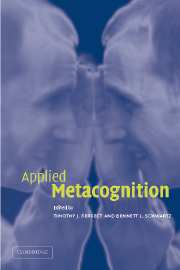Book contents
- Frontmatter
- Contents
- List of contributors
- Preface
- 1 Introduction: toward an applied metacognition
- Part 1 Metacognition in learning and education
- Part 2 Metacognition in everyday memory
- Part 3 Metacognition in different populations
- 8 Metacognition in older adults: implications for application
- 9 Sense and sensitivity: metacognition in Alzheimer's disease
- 10 The development of metacognitive knowledge in children and adolescents
- Conclusions
- References
9 - Sense and sensitivity: metacognition in Alzheimer's disease
Published online by Cambridge University Press: 22 September 2009
- Frontmatter
- Contents
- List of contributors
- Preface
- 1 Introduction: toward an applied metacognition
- Part 1 Metacognition in learning and education
- Part 2 Metacognition in everyday memory
- Part 3 Metacognition in different populations
- 8 Metacognition in older adults: implications for application
- 9 Sense and sensitivity: metacognition in Alzheimer's disease
- 10 The development of metacognitive knowledge in children and adolescents
- Conclusions
- References
Summary
Everyone complains of his memory,
and no one complains of his judgement.
François Duc de La Rochefoucauld, (1613–1680)Consider two presentations of patients that are typical of people attending memory clinics for neuropsychological assessment. Patient A was referred by her family doctor, after her husband had insisted that she had a professional opinion on her memory problems. She presented with a marked memory impairment, but enjoyed the testing session and joked about her memory not being as good as it used to be, but she was confident that she was scoring well in the formal assessments of memory. She could give no examples of her memory difficulties, and denied it was having any impact on her life. And yet, just the day before she had been upset that she could not remember her grandchildren's names, or recognise her sister. Patient B self-referred to see a community-based screening team and harangued his family doctor for a referral for formal memory assessment. He did not joke about his problems, but complained constantly that his memory was failing him. He gave detailed vignettes of recent memory failures, such as failing to lock up the house, but his scores on a range of memory assessments were well within the normal range. Detailed testing, history, and medical examination suggested that Patient A had Alzheimer's disease, and that Patient B was one of the group of clients called the “worried well.”
- Type
- Chapter
- Information
- Applied Metacognition , pp. 197 - 223Publisher: Cambridge University PressPrint publication year: 2002
References
- 7
- Cited by



